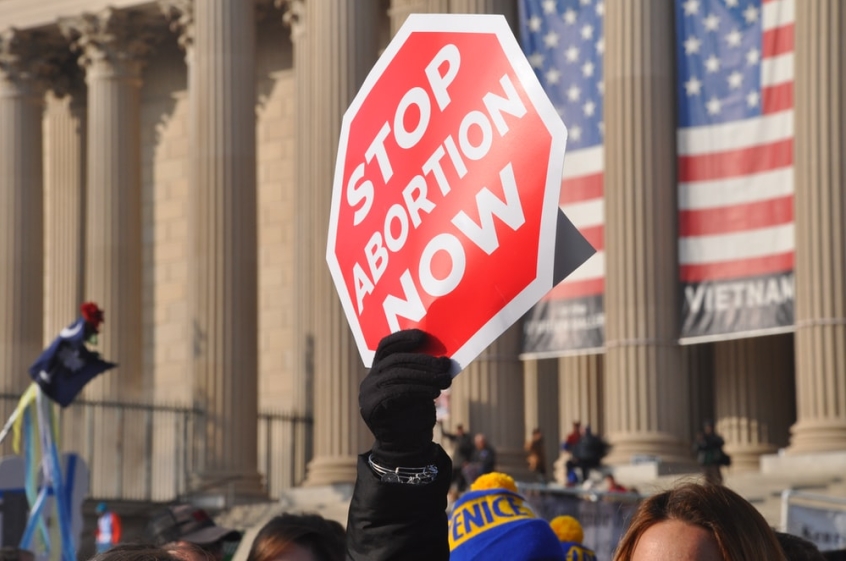
A federal judge Friday temporarily reinstated a controversial Texas law that bans abortions as early as six weeks of gestation, striking down a lower federal court ruling that temporarily blocked the state from enforcing the legislation.
The 5th U.S. Circuit Court of Appeals granted a request from the Texas Attorney General's Office to temporarily suspend a judge's order blocking the Texas Heartbeat Act. The two-page ruling gives the U.S. Department of Justice until Oct. 12 to reply.
The Texas Heartbeat Act, which took effect on Sept. 1, bans most abortions after a fetal heartbeat can be detected. It also allows private citizens to take civil action against anyone who "performs and induces an abortion" or "knowingly engages in conduct that aids or abets the performance or inducement of an abortion, including paying for or reimbursing the costs of abortion through insurance or otherwise."
"Tonight the Fifth Circuit has granted an administrative stay in the #SB8 case. I will continue to fight to keep #Texas free from federal overreach," Texas Attorney General Ken Paxton tweeted Friday night.
The progressive legal organization American Civil Liberties Union called the 5th Circuit's order "deeply alarming" because it allows the law to go back into effect when "abortion providers were quickly starting to resume abortion care for all patients."
"Today's order means that the havoc that this law has created is allowed to restart," Deputy Director of the ACLU Reproductive Freedom Project Brigitte Amiri said in a statement. "Make no mistake: The devastating impacts of this ban will be just as bad this time around."
Kimberlyn Schwartz, the director of media and communications for the pro-life advocacy group Texas Right to Life, said the 5th Circuit's order is an "answered prayer."
"The Texas Heartbeat Act saves approximately 100 lives from abortion per day, and we're grateful that this tremendous impact will continue," she said. "We expect the Biden administration to appeal to the Supreme Court of the U.S., and we are confident Texas will continue to defeat these attacks on our life-saving efforts."
The ruling comes two days after a federal judge granted a request from the Justice Department for a temporary restraining order against Senate Bill 8, drawing swift praise from the Biden administration and abortion providers and criticism from pro-life advocates.
U.S. District Court Judge Robert Pitman, an appointee of former President Barack Obama based in Austin, had argued in Wednesday's ruling that the law "violates the Constitution and has a widespread effect."
Chelsey Youman, Texas state director of the pro-life organization Human Coalition Action, called Pittman's ruling "a shameless example of unfettered judicial activism."
"[Pittman's] historic injunction has no regard for the rule of law and is more about partisan politics than a fair judgment of the law," she said in a statement to The Christian Post.
The DOJ has argued that the U.S. Supreme Court's 1973 Roe v. Wade decision recognizes the "constitutional right to terminate a pregnancy," which legalized abortion nationwide.
Last month, the U.S. Department of Health and Human Services introduced a "three-pronged Department-wide response" to the Texas Heartbeat Act aimed at protecting "reproductive health care for Texans" and improving "access to safe and legal abortions in Texas."
HHS Secretary Xavier Becerra said that "every American deserves access to health care no matter where they live — including access to safe and legal abortions."
A Texas obstetrician and gynecologist who began his career before abortion became a constitutional right publicly stated last month that he violated the law by providing an abortion to a woman whose pregnancy was "beyond the state's new limit."
"I acted because I had a duty of care to this patient, as I do for all patients, and because she has a fundamental right to receive this care," Dr. Alan Braid wrote in an op-ed for The Washington Post.
John Seago, legislative director for Texas Right to Life, told The Wall Street Journal at the time that his organization was looking into whether Braid's claims are anything more than a "legal stunt."
He said that the new law provides a four-year statute of limitations for people to sue violators.
"It definitely seems like a legal stunt and we are looking into whether it is more than that," Seago was quoted as saying.
Courtesy of The Christian Post













